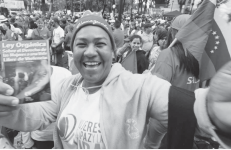Journalistische Artikel
Der Neoliberalismus ist in Lateinamerika nicht oder nur mit enormer Gewalt durchzusetzen. Das ist ein Schuss vor den Bug der Eliten
Ende der rechten Einheitsfront ‒ Wie die aktuellen Aufstände Lateinamerika verändern
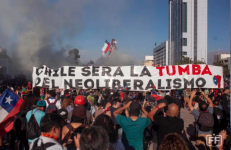
Proteste, Aufstände und Regierungswechsel in Lateinamerika und der Karibik: In Ecuador hat eine Revolte gegen die IWF-Politik die Regierung vorerst zum Einlenken gezwungen. In Haiti tobt ein Aufstand gegen die US-gestützte Regierung. In Chile protestieren und streiken Millionen für ein Ende der neoliberalen Politik, den Rücktritt des rechten Präsidenten und Milliardärs Sebastián Piñera und eine neue Verfassung. Honduras und Panama erleben ebenfalls Massenproteste.
INTERVIEW
BAR Book Forum: Dario Azzellini’s “Communes and Workers' Control in Venezuela”
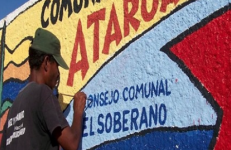
Millions of Venezuelans are building socialism from below, and most of them are Black, brown and female.
“The mainstream media, and even many people considering themselves leftists, cannot understand why the Maduro government is still in power.”
In this series, we ask acclaimed authors to answer five questions about their book. This week’s featured author is Dario Azzellini . Azzellini is a visiting fellow at the Latin American Studies Program, Cornell University. His book is Communes and Workers' Control in Venezuela: Building 21st Century Socialism from Below.
"Nosotros, sus amigos en el extranjero haremos lo que sea necesario para apoyarlo con todos los medios y a través de todos los canales diplomáticos disponibles para nosotros".
Académicos se pronuncian sobre Rojava: "¡Se trata de la humanidad, nunca se rindan!"
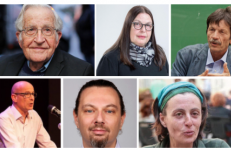
Mientras continúa la guerra de agresión turca contra Rojava y el noreste de Siria, hay protestas contra ella en todo el mundo. Los intelectuales y académicos se pronuncian y condenan esta guerra y muestran solidaridad con Rojava y el noreste de Siria.
A continuación, publicamos declaraciones del Prof. Noam Chomsky, Prof. Federica Giardini, Dr. Dario Azzellini, Dr. Joost Jongerden, Prof. Kariane Westrheim y Prof. Ueli Mäder que expresaron su solidaridad.
Prof. Noam Chomsky, lingüista, filósofo e historiador, EE. UU.:
"We, your friends abroad will do whatever it takes to support you with all means and through every diplomatic channel available to us."
Academics for Rojava: "It's about humanity, never give up!”
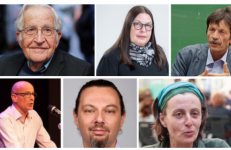
While the Turkish war of aggression against Rojava and North-East Syria continues, there are protests against it worldwide. Intellectuals and academics speak out and condemn this war and show solidarity with Rojava and Northeast Syria.
In the following, we publish statements of Prof. Noam Chomsky, Prof. Federica Giardini, Dr. Dario Azzellini, Dr. Joost Jongerden, Prof. Kariane Westrheim and Prof. Ueli Mäder who expressed their solidarity.
Prof. Noam Chomsky, linguist, philosopher and historian, USA:
“Hard to convey how wrenching all of this is.
La révolution bolivarienne peutelle survivre à la crise au Venezuela?
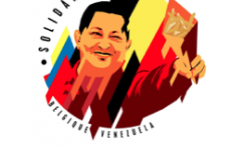
Une des réalisations les plus importantes du gouvernement chaviste du Venezuela a peut-être été de créer un espace dans lequel la Révolution Bolivarienne a pu s’épanouir. Mais cette révolution peut-elle survivre à la crise actuelle?
Can the Bolivarian revolution survive the Venezuelan crisis?
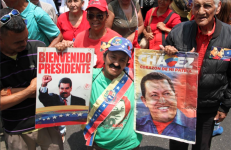
Creating the space for and allowing the Bolivarian Revolution to flourish is perhaps the most important achievement of Venezuela’s Chavista government — but can it survive the current crisis?
Interview
Dr. Dario Azzellini: Bridging the gap between academica, activism & filmmaking
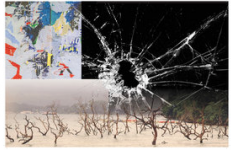
“How do you neutralize a revolutionary?... you give him an office with air conditioning.” This was one of several humorous anecdotes that Dr. Azzellini shared with me during our interview. Dr. Azzellini’s eyes twinkled with amusement as he recounted this joke someone once told him. His incisive and dynamic way of thinking and conceptualizing ideas and connections increasingly became evident during our interview.
Interview mit Dario Azzellini:
VENEZUELA »Wir haben es mit einer ganz klassischen, imperialistischen Regime-Change-Politik zu tun«
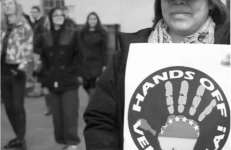
Der Politikwissenschafter DARIO AZZELLINI hat mehrere Bücher über die politischen Entwicklungen in Venezuela veröffentlicht. Schwerpunkt seiner Forschung sind Prozesse sozialer Transformation. Er ist Gründungsmitglied des 2011 gegründeten Internetarchivs workerscontrol.net, das Texte zum Thema ArbeiterInnenselbstverwaltung sammelt. Für die Volksstimme hat RAINER HACKAUF mit Azzellini über die aktuelle Lage in Venezuela gesprochen.
Der Putschversuch gegen den amtierenden Präsidenten Nicolás Maduro scheint ins Stocken geraten. Ein falscher Eindruck?
Interview mit Dario Azzellini
Venezuela: „Es ist Falsch, von Hilfslieferungen zu reden“
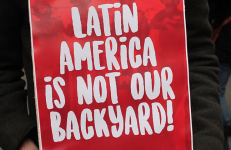
In Venezuela geht es nicht um Hilfslieferungen und Demokratie, sondern darum, dass die US-Regierung ihren Hinterhof wieder unter Kontrolle bringen möchte. Ein Interview mit Dario Azzellini
marx21: Im Moment spielt der Streit um Hilfslieferungen in der Berichterstattung die Hauptrolle. Es ist von Hunger die Rede, von fehlenden Medikamenten. Wie ist die Versorgungslage in Venezuela?
Golpe en curso en Venezuela
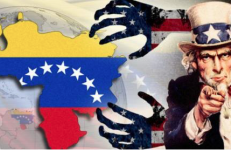
En Venezuela hay un intento de golpe respaldado por Estados Unidos en pleno desarrollo. El 23 de enero, el político opositor hasta ahora desconocido, Juan Guaidó (que asumió sólo el 5 de enero de 2019 como presidente de la Asamblea Nacional declarada ilegal por el tribunal supremo de Venezuela) se autoproclamó presidente de Venezuela. Lo hizo alentado por el gobierno de los Estados Unidos. El golpe se preparó en conversaciones secretas en presencia de representantes del gobierno colombiano en los EEUU.
Gespräch mit Dario Azzellini
Die Zukunft Venezuelas
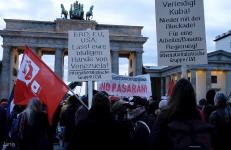
Neben Deutschland haben mehrere EU-Länder Oppositionsführer Guaidó als Übergangspräsidenten Venezuelas anerkannt - und damit den Druck auf Staatschef Maduro erhöht.
Allerdings sollte man die Fordungen nach einer demokratischen Veränderung der Situation in Venezuela nicht so wörtlich nehmen: Das Zeil ist eindeutig der Sturz des venezuelanischen Präsidenten Nicola Maduros. Und wenns sein muss, mit militärischen Mitteln.
Soweit Dario Azzellini Einschätzung zu den Geschehnissen um Venezuela
Zur Lage in Venezuela - Gespräch mit Dario Azzellini
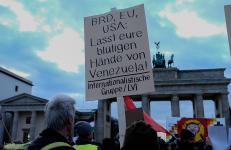
Am 23.1. rief sich der Oppositionspoliter Guaidó zum Präsidenten Venezuelas aus. Die Anerkennung durch die USA folgte umgehend, später zog unter anderem Deutschland nach. coloRadio bat den Politikwissenschaftler und Publizisten Dario Azzelini um eine Einschätzung zu den Vorgängen. Er hat sich unter anderem mit Basisinitiativen und Selbstverwaltung in Venezuela beschäftigt und kennt daher Land und Leute. Zuerst wollten wir wissen, wie er die Lage mit den beiden konkurrierenden Präsidenten einschätzt.
AutorInnen: MoMa
Bilder: Janis Garnet / Berlin Feb. 2019
und wie weiter?
Putschversuch in Venezuela
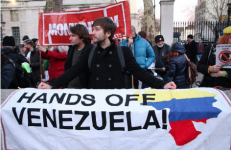
In Venezuela ist ein von den USA unterstützter Putschversuch im vollen Gange. Am 23. Januar ernannte sich der bis dato weitgehend unbekannte Oppositionspolitiker Juan Guaidó und erst seit dem 5. Januar 2019 Vorsitzender der Nationalversammlung selbst zum Präsidenten Venezuelas. Dabei wurde er offenbar von der US-Regierung ermuntert. Der Putsch wurde in Geheimgesprächen in Anwesenheit Gesandter der kolumbianischen Regierung in den USA vorbereitet. Auf die Selbsternennung Guaidó erfolgte die sofortige Anerkennung durch die US- und die kanadische Regierung.
Activistas y estudiosos responden a una pregunta que se hace la izquierda en todo el mundo
¿Cómo se manifiesta la lucha de clases en el siglo XXI?
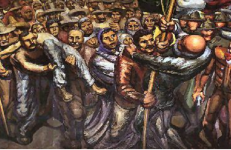
Dario azzellini, Profesor del Departamento de Sociología del Desarrollo, Universidad de Cornell (Ithaca). Su publicación más recientes es Luchas obreras en el siglo XXI (Brill / Haymarket, 2018)
Talk at the Asia-Europe People’s Forum and transform! conference "Our Common Social Future," Barcelona, June 8-10, 2018 - 10 juni 2018
Commons and Conflict
Today, everyone is speaking about commons and ‘commoning’, everyone wants to build commons. The World Bank has a group which is supposedly ‘protecting and improving the global commons’ and it reaches out to the private sector to ‘advance common goods’. You can find texts on commons on the website of the European Union, banks organize seminars on the commons. Transnational companies tell us they are building the commons, big magazines declare that Uber is commoning cars, and that the “sharing economy” is a form of commoning.
Interview with Dario Azzellini
Yes We Can: Worker-Owned Coops
Founded in 1973, (yes, that’s 45 years ago!) the Park Slope Food Coop is one of the oldest and largest consumer food coops in the country. It’s a presence in our lives, the source of our food, and a center for community engagement. And it’s also part of a larger coop movement that stretches back in time and exists in many parts of the world.
One Question in On State of Nature Blog
What does class struggle mean today?
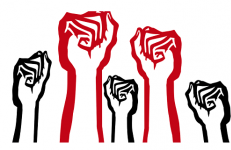
What does class struggle mean today?
Class struggle, that is, the struggle between labour and capital, is not at all a concept that belongs to the past. In a world of growing inequality, it is a reality more pertinent than ever. A recent study has revealed that since 2008 the wealth of the richest 1% has been growing at an average of 6% a year, while the wealth of the remaining 99% of the world’s population has been growing by only 3%. By 2030, the world’s richest 1% will control nearly two-thirds of the world’s wealth.
Dario Azzellini ile röportaj
İŞÇİ KONSEYLERİNDEN GÜNÜMÜZ KÜBA KOOPERATİÇİLİĞİNE: Konuş Kolektif Hafıza
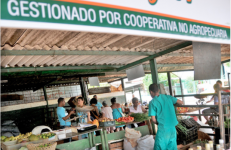
“Beşik dipsiz uçurumun üzerinde sallanıyor ve sağduyu bize varlığın iki karanlık ebediyet içinde anlık bir ışık kırılmasından ibaret olduğunu söylüyor” diyor Nabokov. Ama bir de kolektif hafıza var. Paul Fraisse’den aktaralım: “Hiçbir zaman yalnız değiliz... En şahsi hatıralarımız bile içinde yaşadığımız topluluğa sıkı sıkıya bağlı”. İşte şimdi o kolektif hafızaya kulak veriyoruz. Dario Azzellini’ye bağlanıp 1956 Macaristan ayaklanmasından başlayıp güncel Küba kooperatifçilik hareketine uzanan işçi kolektiflerini dinliyoruz.
Radio Corax: interview mit Dario Azzellini
Wer die Wahl und Maduro disqualifiziert, versteht Venezuela nicht
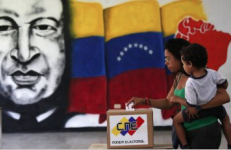
Ende Mai wurde in Venezuela Nicolas Maduro erneut zum Präsidenten gewählt. Die internationalen Reaktionen auf das Ergebnis waren unterschiedlich. Während einige Länder, unter anderem Kuba gratulierten, hat der US-Außenminister Mike Pompeo die Wahl als Schwindel bezeichnet und Sanktionen angekündigt. In Europa und von der Lima-Gruppe wurden Stimmen laut, dass die Wahl undemokratisch abgelaufen sei. Eine andere Sicht auf die Wahl und die Situation in Venezuela hat der linke Sozialwissenschaftler Dario Azzellini.
Elezioni presidenziali in Venezuela, 20 maggio 2018
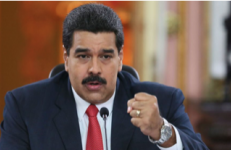
I primi risultati preliminari annunciati dal Consiglio Nazionale Elettorale del Venezuela danno il presidente Nicolás Maduro come vincitore delle elezioni presidenziali con il 68% dei voti con una partecipazione elettorale tra il 46 e il 48%. Maduro ha ricevuto 5.823.728 voti. Il principale candidato dell’opposizione Henri Falcón ha raggiunto il 21%, 1.820.552 voti, l’oppositore evangelico Javier Bertucci 925.042 voti e il candidato della sinistra trotzkista di opposizione Reinaldo Quijada ha ricevuto 34.614 voti.
Elecciones presidenciales en Venezuela, 20 de mayo 2018
"Quien descalifica el resultado electoral, quien no lo entiende, no entiende a Venezuela“
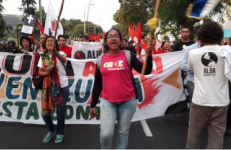
Los primeros resultados preliminares anunciados por el Consejo Nacional Electoral (CNE) en Venezuela dan al presidente Nicolás Maduro como ganador de las elecciones presidenciales con un 68% de los votos y con una participación electoral entre el 46 y 48%. Maduro recibió 5.823.728 votos. El principal candidato opositor Henri Falcón juntó un 21%, 1.820.552 votos; el opositor evangélico Javier Bertucci 925.042 votos y el candidato de la izquierda opositora trotskista Reinaldo Quijada, recibió 34.614 votos.
Dario Azzellini zu den Wahlen in Venezuela, der Kritik von Basisaktivisten an der Regierung und warum sie dennoch Maduro gewählt haben
"Wer das Wahlergebnis disqualifiziert, wer es nicht versteht, versteht Venezuela nicht"
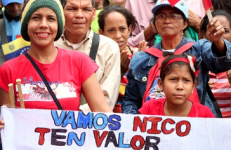
Dem zweiten offiziellen Bulletin vom Nationalen Wahlrat in Venezuela gemäß ging Präsident Nicolás Maduro als klarer Sieger der Präsidentschaftswahlen hervor. Er erhielt 67,76 Prozent der Stimmen bei einer Wahlbeteiligung zwischen 46,02 Prozent (bei 98,7 Prozent ausgezählten Stimmen). Maduro kam auf 6.190.612 Stimmen.
Entrevista con Dario Azzellini
Comunas y control obrero en Venezuela
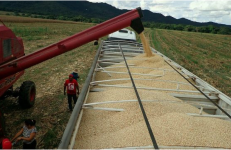
“Las comunas deben ser el espacio sobre el cual vamos a parir el socialismo”, son palabras pronunciadas por Hugo Chávez en uno de sus famosos programas de radio “Aló presidente”. Hemos entrevistado a Dario Azzellini* para hablar de las comunas venezolanas y de las nuevas formas de participación, así como de sus éxitos, dificultades y contradicciones. Dario Azzellini ha investigado y documentado estos temas a lo largo de toda la Revolución Bolivariana. Haymarket Books acaba de publicar en edición de bolsillo su libro Communes and Workers’ Control in Venezuela.
Entrevista a Dario Azzellini
Desafiar el capitalisme per mitjà del control obrer, Per què és important el control obrer?
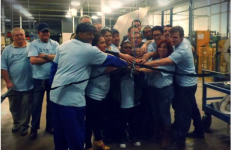
Una característica comuna de cada situació de crisi, des dels aixecaments de principis del segle XX fins a les reestructuracions neoliberals de la fi d'aquest mateix segle, és l'aparició del control obrer: els obrers s'organitzen per fer-se càrrec dels seus llocs de treball per tal de defensar els seus llocs de treball i les seves comunitats.
Entrevista con Dario Azzellini
Desafiar al capitalismo por medio del control obrero
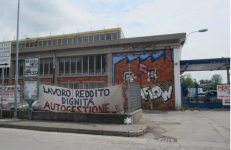
Una característica común de cada situación de crisis, desde los levantamientos de principios del siglo XX hasta las reestructuraciones neoliberales de finales de ese mismo siglo, es la aparición del control obrero: los obreros se organizan para hacerse cargo de sus lugares de trabajo con el fin de defender sus puestos de trabajo y sus comunidades.
Interview avec Dario Azzellini
Communes et contrôle ouvrier au Venezuela
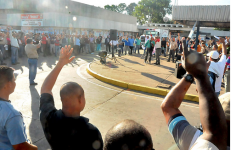
“Les communes devraient être l’espace dans lequel nous allons donner naissance au socialisme” – tels étaient les mots de Hugo Chávez dans une de ses fameuses émissions présidentielles. Pour discuter des communes vénézuéliennes et des nouvelles formes de participation, ainsi que de leurs succès, difficultés et contradictions, nous avons interviewé Dario Azzellini *. Il a étudié et documenté ces questions tout au long de la révolution Bolivarienne. Son livre «Communes and Workers’ Control in Venezuela » a récemment été publié en livre de poche par Haymarket Books.
interview with Dario Azzellini
Communes and Workers’ Control in Venezuela
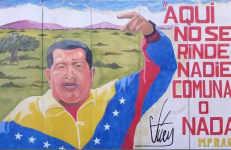
“The communes should be the space in which we are going to give birth to socialism.” – these were the words of Hugo Chávez in one of his famous presidential broadcasts. To discuss the Venezuelan communes and the new forms of participation, as well as its successes, difficulties and contradictions, we have interviewed Dario Azzellini*. He has investigated and documented theses issues throughout the Bolivarian Revolution. His book Communes and Workers’ Control in Venezuela has recently been released in paperback by Haymarket Books.
interview with Dario Azzellini
Challenging capitalism through workers’ control
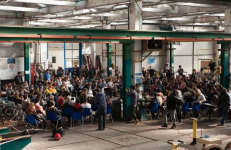
A common feature in every crisis situation, from the upheavals of the early 20th century to the neo-liberal re-structurings of the late 20th century, is the emergence of workers’ control – workers organising to take over their workplaces in order to defend their jobs and their communities.
Bilbao resucita a Karl Marx
Entrevista El Salto: “La democracia tiene que estar adaptada a los diferentes lugares”
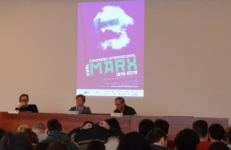
Bilbao se tiñó de rojo la semana pasada, y esta vez la culpable no fue ninguna afición visitante, sino la vuelta de uno de los clásicos. Los días 1, 2 y 3 de marzo la capital vizcaína acogió el Congreso Internacional Karl Marx, celebrado por el bicentenario de su nacimiento y organizado por el grupo de investigación Parte Hartuz y el Departamento de Ciencia Política y de la Administración de la UPV-EHU, con el apoyo de la Universidad y la colaboración de Betiko Fundazioa y diversos agentes políticos, sociales y sindicales.
